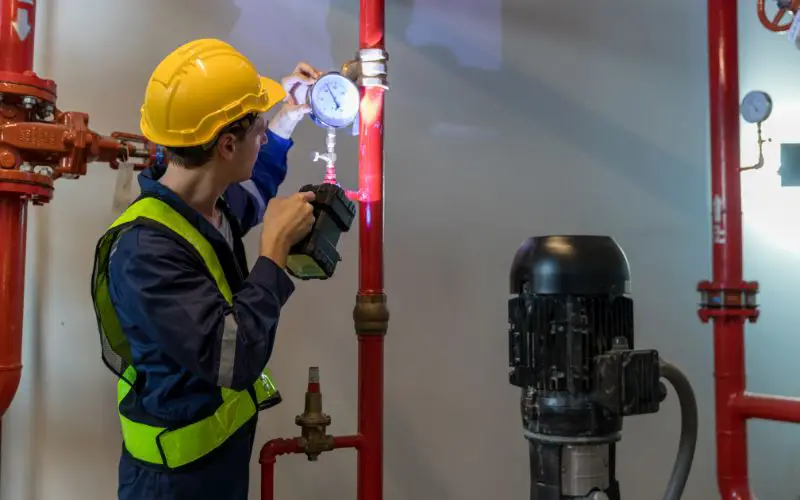Fire systems specialists are highly trained professionals liable for the design, installation, maintenance and testing of fire protection systems. These systems play a vital role in protecting life and property from the cataclysmic effects of fire. To become a fire suppression systems professional, one must complete certain requirements, including education, practice, and certification. In this article, we’ll dive into the world of fire systems professionals and explore the qualifications needed to pursue this career.
Understand the Role of the Fire Suppression System Specialist
Before discussing the prerequisites, it is important to understand the role and importance of fire system specialists. These professionals help ensure that buildings and installations are equipped with efficient fire protection measures. Their responsibilities include a variety of tasks, including:
Designing of fire protection system: Fire suppression systems professionals are responsible for drawing fire protection plans tailored to a building’s specific needs. This includes electing appropriate fire suppression systems, alarms and other safety measures.
Installation and maintenance: They oversee the induction of fire protection systems and ensure they meet all safety norms. Regular maintenance and testing are also part of their duties to ensure that these systems remain in optimal operating condition. Updating fire safety rules and regulations is essential. Fire suppression systems professionals must ensure that all installations meet these codes to keep up compliance and safety.
Education and training: Educating building residents about fire safety procedures and organizing drills is an essential aspect of their role. They can also train workers on how to use fire protection equipment.
Urgent response: In the event of a fire, fire systems experts may be involved in reconciling emergency response activities, including working closely with firefighters and different first responders. Now that we have a clear understanding of their role, let’s look at the prerequisites for becoming a fire systems specialist.
Education and Training Requirements
High School Diploma: The path to becoming a fire suppression systems professional often begins with a high school diploma or equivalent. A strong background in mathematics, physics and chemistry may be an advantage.
Associate Degree: Aspiring fire protection systems professionals pursue associate degrees in fields such as fire science, engineering technology or a related major. This provides solid educational training in fire protection systems.
License: Although not always required, some employers still prefer candidates with bachelor’s degrees in fields such as fire protection engineering or mechanical engineering. Advanced degrees can open doors to higher professional positions and opportunities.
Certifications and Licenses
NICE Certification: The National Institute for Certification of Engineering Technology (NICET) lends certification programs directed to fire protection engineering technology. Achieving NICET certification substantiates competency and is highly regarded in the industry.
State License: Licensing requirements vary by state and locality. Several states require fire systems professionals to have a specific state license to practice. This often involves passing an examination and meeting specific experience requirements.
Experience and Skills
Regarding professional training, Gaining practical experience is priceless in this field. Many fire systems professionals start as apprentices or technicians, learning the basics under the advice of experienced professionals.
Technology skills: Proficiency in understanding and using fire protection networks, including alarms, spray, and fire suppression systems, is required. Good technical and problem-solving skills are appreciated.
Communication skill: Fire systems professionals often interact with customers, building owners, and regulators. Effective communication skills are essential to convey complex facts and ensure compliance with safety rules.
Continuing Education
The field of fire protection is continually evolving, with advances in technology and alterations in safety regulations. To maintain relevance and excellence in their careers, fire systems professionals must undergo continuous professional development. This may involve attending seminars workshops, and obtaining additional certifications to specialize in certain areas like fire alarm systems or sprinkler design.
The Importance of Ethical Behavior
The importance of ethical behavior cannot be overstated in the field of fire suppression systems professionals. These professionals are deeply responsible for personal safety and protecting valuable assets. Compliance with ethical standards is not a simple formality; it is a fundamental condition that underlies their entire operations. Here are some key aspects that highlight the importance of ethical behavior in this field:
Public trust: Fire suppression systems professionals are responsible for public safety. Building owners, residents and neighborhoods rely on their expertise to ensure fire protection systems operate as intended. Ethical behavior is the foundation for building trust. When individuals know that they can trust the integrity of these professionals, they will feel safer in their environment.
Regulatory compliance: The fire protection sector is subject to strict regulations and rules. Ethical behavior involves consistent adherence to these standards. Taking shortcuts or compromising security to save time or resources is not an option. By strictly adhering to regulations, fire systems experts help keep up the highest level of safety for everyone involved.
Professionalism: Ethical behavior is a sign of professionalism. Fire systems professionals interact with a variety of stakeholders, including customers, building owners, regulators and professional colleagues. Treating all parties with respect, honesty and fairness will enhance positive professional fame, which can lead to more opportunities and long-term relationships.
Risk reduction: Ethical behavior can be a powerful tool for minimizing risk. Fire systems professionals who prioritize safety and honesty are less likely to meet legal issues, lawsuits or accidents akin to their work. This not only guards their own interests but also those of their customers and the wider community.
Conclusion
Fire suppression systems specialists are essential experts in the field of fire protection. Their role in the design, installation, maintenance and testing of fire protection systems is essential to saving lives and property. To begin a successful career as a fire systems professional, individuals must meet some prerequisites. Additionally, a commitment to ethical behavior and ongoing professional development is critical to remaining current in this vigorous field. As fire safety remains to be a top priority, the demand for qualified fire protection systems professionals remains high, making this a rewarding and moving career choice for those who meet the requirements.
